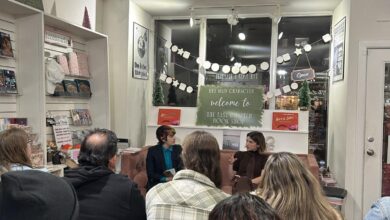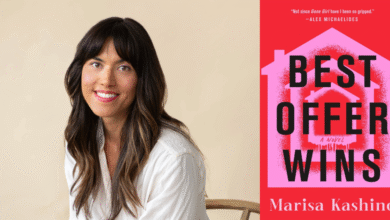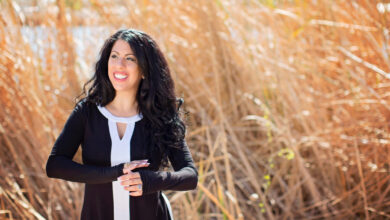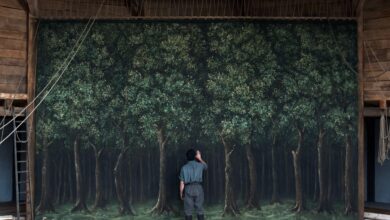Indies Introduce Q&A with Victoria Zeller
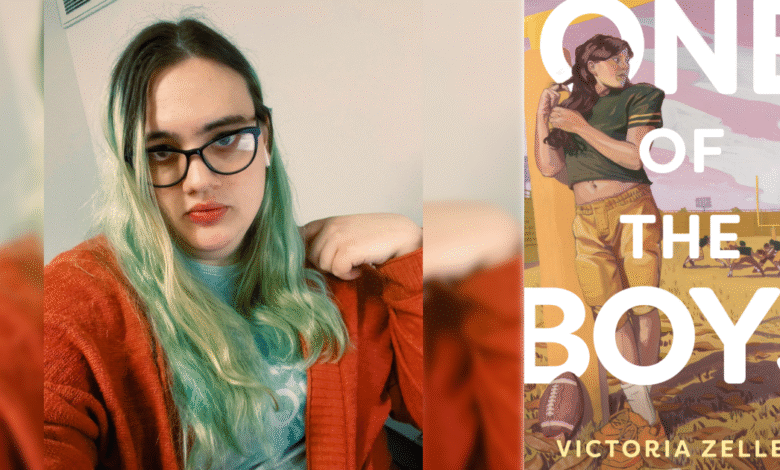
Victoria Zeller is the author of One of the Boys, a Winter/Spring 2025 Indies Introduce YA selection, and May/June 2025 Kids’ Next List pick.
Jessica Hahl of Books Inc. in the Bay Area of California, served on the panel that selected Zeller’s book for Indies Introduce.
Hahl said of the title, “What happens after the coming-of-age story ends? You still have to go to school the next year. Grace made some big changes last year, and is finding a new sense of balance as she begins her senior year. That new balance is disrupted when her old identity and passions come knocking. Can she stand on her new foundation amidst the triumphs and defeats, and epic highs and lows of high-school football? Tender, awkward, joyful — this book has everything.”
Zeller sat down with Hahl to discuss her debut title. This is a transcript of their discussion. You can listen to the interview on the ABA podcast, BookED.
Jessica Hahl: Hello, and welcome. I’m Jessica from Books Inc. in the Bay Area, and I’m so excited to speak with Victoria Zeller, author of One of the Boys. Victoria Zeller is a trans writer, born and raised in Buffalo, New York, where she still proudly resides. A former football player and a lifelong fan, her initial focus was sports journalism before she made a sharp pivot to writing about queers who can’t stay out of trouble. Her sports writing can be found at Defactor, while her manic minute-by-minute sports analysis can be found on Bluesky @dirtbagqueer.rocks.
One of the Boys is her debut novel. It goes on sale May 13, and I hope you all rush to your local indie bookstore and grab it right off the shelf. I’m so excited to get to speak with you today, Victoria.
Victoria Zeller: Thank you. Happy to be here. We had such an adventure getting ready — technical difficulties — but excited to talk about something that’s more fun, which is the book!
JH: Yes! I felt like every broad piece of the book was so grounded in reality, like I could turn a corner and I would see this high school, or I could walk into any locker room and find these characters. But of course, the character at the heart of the book is Grace. Did she come to you in a dream one night, fully realized, or was there sort of a long process to get to know her and to find the meat of her story?
VZ: With pretty much all my characters, it’s definitely a process. With Grace, I had the broad shape of her whole deal pretty early. We have this kid who’s kind of a jock. She kind of has rocks for brains, but she’s also sensitive and insightful and, etc, etc. But she is not very good at expressing herself, or articulating any of that. For the first year that I worked on this story, it was quite different, because Grace started off this book closeted. It took me a while to figure out that we have to pivot from that. We have to do this other thing, which is obviously the best call for the story. It would not have had time to do all that other stuff.
The core, the heart of Grace was always there from the beginning. But I have to spend time with my characters in order to see the ways that they’ll surprise me. Like it turned out Grace has this interest in flowers and gardening that was not there at the start. I ended up finding that as I went. So, I’d say a little bit already there, a little bit I had to find her.
JH: Nice. I loved the friendships between all the characters, and the way the characters were surprised to find themselves stepping outside their comfort zone to make and maintain friendships. I’m curious, who do you think you would have been friends with in your high school experience if you went to the same high school that Grace does?
VZ: Hmm, tough question. I think at a certain point in my high school experience, it would have been the jocks, it would have been like the Ahmed/Dre crowd. I was definitely always friendly with kids like that. But the actual answer might be Zoe, who is the friend on the Student Council. I think she’s the treasurer, and she’s very type A, all about her grades.
I think, aspirationally, I would have been like, “Who’s that cool skater, stoner boy? I kind of want to go hang out with him,” but in actuality, I would spend less time with characters like Jamie or Robin. I would probably end up spending time with the jocks and the “nerds,” for lack of a better word.
JH: As a sort of avowed theater nerd myself, I was absolutely delighted to find myself in this locker room with a bunch of jocks and find that sort of reading experience of “I’m friends with these people,” but I wouldn’t have gotten to be friends with them in my own high school experience. So that was a really wonderful piece for me.
That hindsight of adulthood can be very cloudy when it comes to high school years. You hang on to — to steal from the marketing material of the book — the epic highs and lows, and you kind of miss that mid-range that was probably the majority. How did it feel for you as an adult to be spending so much time with high schoolers, at least in your mind?
VZ: It was weirrrrrd. Yeah, it was a mixed bag. It was fun, because of the silly, low stakes hangouts. You’re the exact age where you and most of your friends have jobs, so you have money, and maybe one friend has a car, so you get to take your first wobbly steps into figuring out what it is to live on your own.
But being a high school senior just profoundly sucks. These kids are under so much pressure from every angle that trying to put myself back in that mindset was so tiresome. It wasn’t even social clique-iness, but just, the onslaught of college prep. You’re supposed to have fun, but not too much fun. You are supposed to make decisions that are going to set you up for the whole rest of your life. I’m a kid, I’m 17. I am absolutely not mentally or physically prepared to do that.
So, I did not go into this book thinking, “Oh, wow. This is kind of going to be a book about how much being 17 sucks.” But it really did at a certain point. Also, when I started writing this book, I was 22, so I was not as far removed from it as I am now — I’m turning 27 soon. I have a strange time looking back on that. I have frequently joked that I’m glad that I don’t have to live in Grace’s head anymore, because it sucks, but it was a strange experience for me to be sure.
JH: Yes, and I was so charmed in the ways in which that, “Oh my god, I have to choose what to do with the rest of my life” piece of being a senior in high school dovetailed with Grace’s personal journey about who she is as an individual. She had made the big choice, right? The fact that you still have to wake up the next day and keep living life, I thought was really beautifully blended together in, “Oh, my God. Do I go to college? Do I go to community college? Do I play sports when I go to college?”
And it strikes me that sports, particularly team sports, are an interesting backdrop — and a common thread for our Indies Introduce titles this season — for stories about confronting individual identity. Was that an intentional choice for you? Or maybe to explain it differently: would we still meet Grace if she was on the debate team instead of the football team? Did she need the epic highs and lows of high school football to find herself?
VZ: Oh gosh, so I grew up as a trans woman, and I mostly read books intended for boys when I was a kid. So I grew up reading sports novels. I knew that I wanted to tell a sports story, not just because I sports write sometimes, and I’m very passionate about football and other sports, but because I had never seen a trans sport story. I knew that I wanted to tell a trans sports story.
In terms of meeting Grace if she was on the debate team instead of football: for me, it’s very key that athletics is something you perform with your physical body. I think it’s important that we get to see Grace do something with a body that she feels conflictingly about, and to have this be a very positive, empowering experience for her. When I said earlier that she has rocks for brains, I was being a little unfair. That’s not true. Grace has intelligence, and she expresses it physically, so I think for this character, it had to be a sport. And football is such a big part of my past and such a big part of what I care about now, I knew that this had to be book one for me.
JH: That’s awesome. Not only are our characters so fully fleshed out that I felt like I could poke one of them, the communities that they’re living in, as students in their little subcultures of jocks and theater kids and nerds, are also very real. Were you writing those communities based on your own experience? Or was it trying to sort of scratch an aspirational itch?
VZ: I think it’s a bit of both. In my personal school experience, I played sports, but I was also a video games dork, and I was also in AP classes, and I was also friends with a whole bunch of stoners. So, for me, all of these groups overlap and spill into one another, and you get all these interesting people who are all forced to be in one building at once. That’s very tasty to me in terms of writing a book and writing these characters. So for me, it is definitely influenced by the interesting ways that high schools can force different kinds of people to interact and hang out.
I’m trying to figure out how I want to put this. Grace has a strong core of male friends. I have a strong core of male friends from high school who I’m going to hang out with this evening (as we record on the day of the NFL Draft). So, I’m definitely writing about a mostly male friend group; one of the people transitions; they keep on hanging out. I am writing about a dynamic that I know exists because I’ve experienced it firsthand.
In terms of aspirationally? There’s a lot of really chill men in this book that I could see some people being like, “well, that’s unrealistic.” And I disagree. I don’t think it’s unrealistic that all of these dudes would be cool with Grace. It is certainly not the entire 50-person football team, but most people are like, “yeah, sure, whatever, she’s good at kicking.” It also very much varies. Where do you live? What kind of school is it? What’s the income bracket at the high school? [It’s] aspirational in that I wanted to create a world in which she would have friends from all these like different groups who — not to spoil anything — bend and run together, so you have combinations of people hanging out.
I think that answered the question. That was long winded. Apologies if that was a little labyrinthine, but I tried my best.
JH: I loved that by blending those things together, you put those friendships on display in really beautiful ways, not just in the ways that the friend groups show up for Grace, but also the ways that they show up for each other. I also love seeing male friendships portrayed so wholly in literature, especially when a lot of the time it’s more of a caricature of male friendship.
VZ: Yeah, I frequently read versions of male friendship where I’m like, “This is just a bit off.” I tried to be as grounded with it as I could, while showing the strengths of a stereotypical male friendship, and also some of the weaknesses. These dudes are going to show up for you. Sometimes showing up for you means they’re going to physically stand up for you; or they might have your back, but that doesn’t mean that you talk about your feelings. Thinking about different friendship dynamics was very big for me in figuring out what this book was.
JH: Thank you so much for sharing this tender, awkward, joyful book with us, and I hope everyone rushes to their bookstore on May 13 to pick up One of the Boys.
VZ: Thanks for having me!
One of the Boys by Victoria Zeller (Levine Querido, 97816461450270, Hardcover Young Adult Fiction, $19.99) On Sale: 5/13/2025
Find out more about the author at victoria.monster.
ABA member stores are invited to use this interview or any others in our series of Q&As with Indies Introduce debut authors in newsletters and social media and in online and in-store promotions. Please let us know if you do.
Source link

